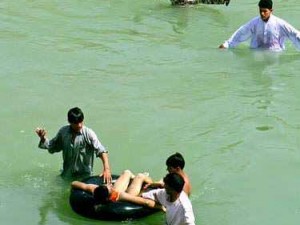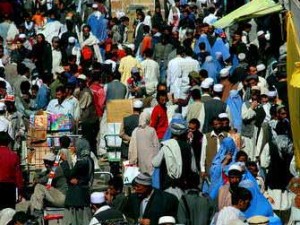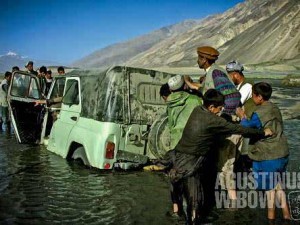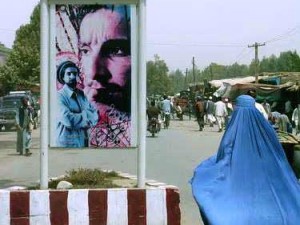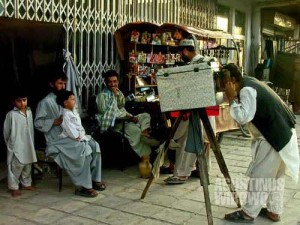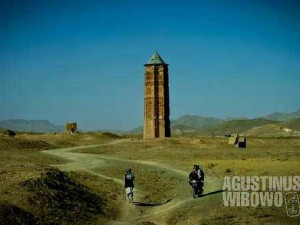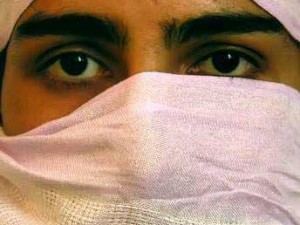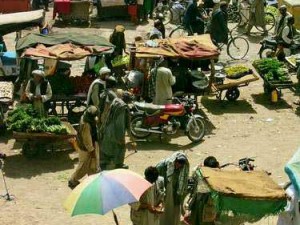Articles by Agustinus Wibowo
The ancient civilization of Balkh “I am not a communist. I am a Muslim” – Khan Agha Arvin The present day tiny town of Balkh, 30 minutes away from Mazhar e Sharif connected by high speed highway, was before a glorious capital of the Bactrian empire. Today, for the locals, the name Balkh maybe more better translated as pilgrimage sites, where hundreds of holy saints’ mausoleums are located and pilgrims came for blessing and prayers everyday. One among the pilgrims was Khan Agha Arvin, currently worked as vice director of one of Afghanistan’s most famous high schools, Lycee Istiqlal in Kabul. I met him accidentally in the pilgrimage site of Rabia Balkhi, a great Persian woman poet who died in name of love. Arvin, now 47, offered me to go with him and his colleagues around the old town. Offering prayers in holy sites which populate the whole city of Balkh The city walls of Balkh, once walls which protected the great capital of the great empire, now was rubble of history. But for Arvin, the history was still alive. It was here, 12 years ago, when he struggled to defend the truth. 12 years ago, when he was a [...]
Baharak – Passport Check, a Birthday Present
The nondescript bazaar town of Baharak “Everything is wrong in Afghanistan” – Dr. Momin Today is my birthday. I become 25 years old already. And with the wish of luck I departed Ishkashim together with Arnoult. We are heading to Baharak, where I can catch the next transport to Faizabad, and Arnoult was going to Shewa. The shared Falancoach started from Ishkashim at 8. As usual, Afghans have non-understandable concept of time. The driver came to the restaurant and rushed our breakfast as he said that the motor was going to start as soon as possible. It was not before an hour of waiting the motor just started the engine. There were some other passengers also heading to Faizabad, including a man from Tajikistan who spoke Russian with me. The road to Baharak itself is quite boring after the experience in the Wakhan. But Baharak, after 7 hours of nondescript Falancoach journey, was not anymore a nondescript town. In my previous post when I cam to Baharak from Fraizabad, I wrote that this town was sleepy and just a nondescript bazaar twon. But coming from Ishkashim after 2 weeks in isolated Wakhan valley, Baharak seemed flourished. The palao lunch was [...]
Qala Panjah – The Afghan Values
The question is how to unite all of them. “What are the values to be a nation?” Arnault Sera It was a long dusty journey in the dusty unpaved main road connecting the Badakhshan province to Takhar. With most roads in the country unpaved and full of dust, Afghanistan simply might be the dustiest country in the world. Traveling here is not easy either. Passengers are usually packed, pressed in carries like Falancoach, can load up to 18 passengers (many times overloaded up till 20 people) in the narrow seats of the car. Those who can afford more might choose TownAce, comfortably at 7 passengers in the car. If the road track is not too difficult, Corolla and shared taxi might be the most comfortable way of traveling. Traveling is always costly in Afghanistan. Even the cheapest Falancoach may only carry you traveling from Faizabad to Ishkashim for 550 Af (11 $) for the 160 km distance, while the same amount in Pakistan might take you 1000 km away. In anyway, traveling in countryside of Afghanistan requires high stamina, luck, bunch of money, endurances. I was not made for this kind of trip, as most of the way, I force [...]
Qala Panjah – Leaving Wakhan
The water is too deep to cross. Today Mr. Juma Khan had to go to Khandod for a business, so I had the chance to hich his tractor to go back as far as Khandod. Transport in Wakhan Valley is always difficult and chance like this of course doesn’t come everyday. My legs are still painful after the long hike some days before and I hardly can walk long. It was not only me the free loader (muftah). Moalem also took the ride. They way along the southern bank of Wakhan river was quite difficult as there were many rivers and streams to cross, and also the road after the Baba Tangi village was flooded as deep as waist. The river after Baba Tangi was so deep and strong, that we had to throw stones to make the way for the tractor through the water. Then it was another steep climb up the hill. The empty tractor couldn’t make it. Juma Khan was a good leader, and he really knew what to do in all situations. He asked all the hitchhikers (all locals who took the opportunity for free hitch) to collect stones from the mountains and put in the [...]
Krat – The Wakhi People of Krat
Wakhan Corridor is always far and mysterious “Zdravstvui tovarech” – a villager from Krat Freedom is what the Wakhi people are longing for. I never expected my visit to Chapursan, the Wakhi Tajik valley in northern Pakistan, brought me to learn deeper about the life of the same ethnic in Afghanistan side of the valley. In Chapursan, 7 months ago, I stayed in house of Noorkhan, a Wakhi Tajiki from Kil village, where sun doesn’t come at all in winter for 3 months. Who expected, deep in restricted area of Wakhan Corridor, I met friends and relatives of Noorkhan. Faizal-u-Rahman, 29 years old, is a cousin of Alam Jan Dario, a famous man from Zod Khon village in Chapursan, who pioneered tourism in the valley. I met Faizal in in Khandud. He was offering me a hitch on tractor to the village of Krat in Wakhan Valley of Afghanistan. He, together with other people from Chapursan are working for an American NGO, Central Asian Institute, and this moment they are building a school in the village. Chapursan is an area dominated by Wakhi Tajik people, same as in Wakhan Valley, and the Wakhi people follow Ismaili sect of Islam. Only [...]
Ghoz Khan – Bridge of Hope, Tajikistan Border
This is the fun of traveling in Wakhan Corridor “Now I can’t say it’s good or bad. Tomorrow I will see” – Shah-e-Panj Wakhan and Tajikistan are only separated by the Amu River. Tajikistan is visible everywhere from Wakhan Corridor. It looks like a wall of high mountains scattered by green valleys over there across the mighty river. Even the vehicles, camels, horses, and power lines of the country are visible from Afghanistan. But it’s as far as the sky, or at least, it’s double the distance to Kabul. In this side of the river, life is desperate. Qala-e-Panjah, named after the fort in the village, is a tiny village marking the beginning of the Wakhan Valley. It’s 110 km away from Eshkashem, or 2 day trip by vehicle. Motorable road is existent, but the unpaved road scretched from Ishkashim to Sarhad-e-Boroghil through Qala-e-Panjah is a heritage of the 1960’s. The road often washed by floods from the river and streams making transportation only possible by sturdy Russian jeep, 4WDs, and tractors. Everybody has to work Schools are rare, hospital is not existent, electricity is only produced by private generators, and the nearest bazaar is in Ishkashim, that 2 day [...]
Ishkashim – Peeping Into Tajikistan
Welcome to Badakhshan “In Tajikistan they have everything but money. In Afghanistan we have money but nothing else.” – Mehruddin The distance from Faizabad to the eastern town of Ishkashem is merely 160 km, but as anywhere in Badakhshan province, the road is unpaved and dusty. The transport is also difficult and unreliable. I was staying in the house of a journalist-cum-farmer, Mr Jaffar Tayyar, in the outskirt of Faizabad. As customary in Afghanistan, all long distance public transport departs very early in the morning as traveling after dark is dangerous. To reach the bus depot in Faizabad I had to walk from the village of Mr. Tayyar as early as 4 a.m. There is no direct bus to Ishkashim. First one has to get to Baharaq, 42 km or 2 hours from Faizabad. It costs 150 Af. Baharaq is a nondescript little bazaar village. Here the onward transport to Ishkashim might be found. They only depart when there are enough passengers, and as Ishkashim is not a major destination, thus it’s unreliable. Comfortable public hot water shower in Faizabad I was lucky when I arrived there was a passenger bus (4 WD Toyota coach but mistakenly written as “ATOYOT”) [...]
Faizabad – The Journey to Badakhshan
On a painful journey through mountains to Badakhshan “Taliban never came here” The vehicles taking the passengers from Taloqan to Badakhshan were already busy in the bus depot as early as 5 a.m. in the morning. There were many different types of cars, from the cheapest Falancoach until the costly Volvo. I chose the Falancoach coaster. But I didn’t come quite early, as passengers started to be scarce after 5:30. It was not until 7 the driver successfully collected the passengers to fill up his car and started to depart. I sat on the third line of the seats in a coaster which was supposed to carry 14 passengers, but was overloaded by 18. In front of me, there were two women under burqas. Apparently the younger, slimmer one was the daughter of the older one. When I came to my seat, they were already there, busy with three young kids. There was also another boy sitting next to them, obviously, their relative, as it’s forbidden in Afghanistan for non related male to sit next to female passengers. The ladies and children were surprised when I entered the car, simply because I was foreigner. The old lady didn’t cover her [...]
Taloqan – The Colorful Mondays
Welcome to Taloqan “First it was the culture, then it mixed with the religion” – Sa’dat The city of Taloqan is the capital of the Takhar province, one of Afghanistan northern provinces. Takhar was part of the Qataghan province which once comprised the nowadays provinces of Kunduz, Takhar and Baghlan. Taloqan is hot in summer although compared to Kunduz, it’s much cooler. The city is dusty, but the smoothly paved road which connected the sleepy provincial capital to Kabul promised its brighter future. The city has somehow a strong link with the Islamic Republic of Iran. Unlike other cities in Afghanistan, the roads in Taloqan has clear name and road signs, and many of the main road signs in the town center are backgrounded with Iranian flag, and signed “Afghanistan and Iran”. Some of the roads have quite Iranian smell, like the “Ayatollah Khomeini” St. Some other main roads are Hafez St., and as in all other cities in Afghanistan, the “Ahmad Shah Massoud” St. Massoud is a Tajik warrior from the Panjshir valley who fought against the Taliban and now is respected by many as a national hero. Taloqan: Ahmad Shah Massoud, Iranian flag, and burqa The people of [...]
Kunduz – The Remnants of Guerillas
Security is still a main issue in Afghanistan “Why those commanders haven’t surrendered the weapons yet?” Kunduz is the capital of the Kunduz province, located just 60 km away from the Tajikistan border. Despite the high mountains that lead one to Kunduz from Kabul, Kunduz is a very hot place. The road from Kabul passed through the Salang Tunnel, passing through the stomachs of high mountains that once isolated northern Afghanistan from its central. The tunnels were built in 1960s, before the decades of wars in the country, one of the proofs how prosperous Afghanistan was. The long tunnels, resembled never ending dark caves, were not something to be built by a poor country. When I visited Afghanistan in 2003, the Salang tunnels were closed for reparation, apparently done under foreign reconstruction programs, for several months. The hot weather of Kunduz is comparable to that of Kandahar or Jalalabad, notorious of their heat waves in unforgiving summer peaks. The altituted of Kunduz is merely 400 m, a sudden decrease from the Salang Tunnel which seats on altitude of 3363 m. Kunduz is like the bottom of the plain bowl of Central Asia, with its characterized heat and environment. The people [...]
Kunduz – Set Back
The beautiful land of Pakistan that I saw in my dream “You will have to return back and start to think how to get back to the original place to continue your journey …” Lam Li once told me that after months of traveling, it was a common phenomenon to develop certain “nightmares”. The travelers’ nightmare as she experienced quite often was seeing herself somehow had to be thrown back to her home country, and in the dream she had to struggle hard to return back to the place where the journey was interrupted. “You will have to return back and start to think how to get back to the original place to continue your journey …” I heard about this when I met her in Kandahar. My journey started on July 28, 2005. So it is only a week for it to reach its 1st anniversary. It was a long overland journey from the busy city of Beijing, through the mainland China to the land of the Uyghurs in the west, climbed up the heavenly peaks of Tibet, traversing the province before going down to the peaceful lowland of Nepal. The Annapurna mountain ranges of Nepal left the village [...]
Kabul – Travelling Again
Let’s hit the road again with our favorite Falang Coach After being halted in Kabul for quite a while waiting for my beloved Pakistani friend, at last I had the chance to meet him, after his prolonged stay as a BBC camera man in the conflicted Helmand province. And now I am ready to travel again. Starting from tomorrow, Inshallah, I will venture through the northern Afghanistan to the upnorth province of Badakshan, returned back to the northwest provinces of Kunduz, Balkh, and all the way to Herat. And I also wish to take a peek to Iran, and then back to Afghanistan and take the Central Route to Kabul. During the journey Internet might be difficult and very expensive, so the updating of this Blog might be delayed. But I will keep all of the notes manually and then update it online when I have access to computer and Internet. Thank you very much for your support [...]
Kabul – Understanding Islam from the Eyes of a Pashtun
With enveloping burqa, a woman sees the world through the little holes in front of her eyes “In Islam there is a circle. And we cannot get out the circle” — Amin It was not easy to meet and interview people who praised a lot the Taliban regime in recent day Kabul, at least in my one month here, it was the first time I got the chance. The discussion was not political, instead it was more cultural and religious. Amin, a man of 33 years old from Pashtun ethnic, had spent his 29 years of life in Pakistan. He was a refugee. He speaks very good English, and he expressed his idea very well in the language. He used to live in a tribal area in the NWFP (North West Frontier Province) of Pakistan, the area that the Afghans preferred to refer as Pashtunistan. The tribal areas are the areas of the Pashtuns which are not under the Pakistani law. The tribal area where he lived was Mohmand Agency. His ancestors came from a village called Kandari, both existed in Pakistan and Afghanistan side. In fact he holds two passports: Pakistan and Afghanistan. He agreed to shelter me in [...]
Ghazni – From the Glorious Past
The glorious past has gone, forever The glorious past has gone Ghazni is the capital of province of the same name, located north of Zabul province on the Kabul – Kandahar highway. The altitude of slightly more than 2000 m guarantees the temperature in Ghazni is cool. At this moment, Ghazni is among the riskiest provinces in Afghanistan, where Taliban attacks happen in regular basis in the districts of the province. But as everybody tried to convince, the city is a safe place. Shehr Ahmad Haider is a Pajhwok journalist covering the news of the area. His office is a tiny office in a hotel near the bus station to Kandahar. There are two computers in his 3 x 5 m room, and his main weapons of getting news are: two sets of mobile phones and a desktop phone. He never meets Taliban, despite that most of his news dealing with Taliban. Interviews are done through phones. But he is not idle. In fact, to get at least five news per day he has to make many telephone calls and some visits to the Internet Cafe, the only one in the city and costs beautifully at 70 Afs (1.40 US$) [...]
Kabul – The Woman Movements
Being invisible very often is necessary in a warzone “They feel save being invisible” ——— Lam Li The image of Afghan women which laid the strongest impression among Indonesians, and maybe also other nations in the world, is women hiding in blue burqa, the veil covering the whole head, including hairs, necks, face, and even eyes, makes the body under it completely anonymous. A friend of mine described burqa / burka as invisible blanket, just like the fantasies in those Japanese animations. Whoever wears this blanket will be invisible. Nobody will recognize. No recognition, no attention. “They feel save being invisible,” said Lam Li. Lam Li made her impression after staying quite a while in Pakistan and Afghanistan, particularly Peshawar and Kandahar, among the most conservative places of the two countries. In previous occassion I met her in Peshawar, she describes her inability to understand why the woman always lived under fear, hiding under the purdah. But after more than two months in Kandahar – the heartland of the Pashtuns, after long time interaction with some Kandahar female friends, she started feeling that burka is not a complete symbol of orpession (but she still cannot accept to be forced to [...]
Kandahar – From the Heartland of the Pashtuns
Pottery making is a traditional industry from Peshawar which still survive till today. “Everything here is expensive. But human life is cheap” Kandahar, the second biggest city of Afghanistan, had been lingering in the legends of the country since centuries ago. The description of old folklores about the heatwaves, about the tough desert, and about the hospitality of the Pashtun tribes are still up to date, but no doubt, the prolonged wars and the spread of fundamentalism has changed the face of the city. Living in Kandahar at this peak of the trend “war on terror” is overwhelmed by the concern of security problems. Suicide bombs can happen anywhere, and random shootings on street may deliver hot bullets just next to your feet. Taliban is the one who is always blamed to be the cause of everything, but nobody does really know who was the real actor behind all of the terrors. The politics in Afghanistan is complicated. Not only religious extrimists (thus those who always lay religion as the excuse of everything), manyu foreign nations also have importance and play in Afghan internal politics. Unexpected things can happen here on daily basis The Kandahar life has changed since, and [...]
Kabul – Permit to Wakhan
I really dream to go to the Wakhan Corridor The trip must go on, despite of the incident with money in Bamiyan, which was enough to slow me down and cancelled all of the plans previously made. I was determined to go to explore the unexplored part of Afghanistan, that one if you see the map of Islamic Republic of Afghanistan, the odd shaped ‘tongue’ of the country on its northeast. That is Wakhan corridor of Afghanistan, which separates Pakistan from Tajikistan, which separated the British emporium from the Russian one. During my stay in embassy, I have read many books about Afghanistan, from about the women’s life until the travelling in Afghanistan, and those books have burnt my spirit of travelling and exploring Afghanistan again and again. Wakhan corridor is still a wild area, unexplored, and it’s the off beaten track in off beaten track country of Afghanistan. It’s also sensitive area, bordering Afghanistan with Tajikistan, Pakistan, and the giant China. The area is underdeveloped, completely isolated to outside world in winter (even early summer and end of autumn), and it seemed that it’s locked somewhere in the history, where even the air was the same air filling the [...]
Bamiyan – Being Penniless in Afghanistan :(
No money! How can I survive here? I was so excited to continue my way from Bamiyan. Everything in my mind was about the blue crystal water of the Band-e-Amir, and the adventure that I would have to experience in interior Bamiyan province. I was so excited, until this incident, which evaporated all of my dreams, happened. Yesterday, just before sleeping, I counted my money. My money was put together with my passport, wrapped in an envelope, placed in the zipped pocket on my left chest of my jacket. It was always wrapped properly, and always my habit to count the money every day or every other day. That night, at about 7 pm, with Ayatullah, the Muslim teacher who has religious program in Radio Bamiyan watching me. Actually there were about 5 people living in this room, in the same office where Akbar Danish from the NGO worked. I was a guest, with Ayatullah and other two Hazara guys, plus the servant boy. I was listening to nice dangdut song from my MP3 when trying to pluck out my money from the envelope and to count it. First my passport jumped out. Then I was waiting for the Afghani [...]
Bamiyan – The De-Miners
Our job is to clean up the area for your safety, Sir! This is the life of those people, who risk their life, to find mines and unexploded materials around the Great Buddha statues of Bamiyan. They are those in uniform with Farsi letters: Main Paki, and English writing: De-mining. They are the de-miners working in Bamiyan. The encounter the day before with Saboor and Jamil brought me to learn deeper about the life of the de-miners. Achmad Saboor, a Tajik driver from Panjshir, picked me up to see their work around the Buddha hills. In that car I knew Waisuddin, or Wais, a Pashtun man in his thirties, with very strong short body. He was bearded but it seemed that was just trimmed, he also speaks very good English. Wais is among the most important persons in this demining project of Bamiyan Buddha. I was lucky to know him personally. And he was happy that he could practise his English with me. He is the commander of MCPA (Mine Clearance Planning Agency). The previously introduced Achmad Saboor and Jamil, work in other organization: MDC (Mine Dog Center), sometimes also called as MDG (Mine Dog Group). Saboor is the driver [...]
Muzaffarabad – Missed Call
It was a real call, not just mere a ‘missed call’ March 2, 2006 After the major earthquake disaster on October 8 last year, up till now there were already 2,000 big and small aftershocks, of which the people called as ‘missed call’, as the shocks resembles the short vibration of the mobile phone when a missed call comes. I was not shocked by the small earthquakes, as we also live in earthquake area in our homeland. But the people here, covered by the trauma from the disaster, were all running to the street. Still most people chose to live in tents instead of inhabiting the house buildings; no matter how good and untouched the house was, as everybody was still afraid. I was sleeping in my room at that time, when the young boy in the office urged me to run away immediately. It was a missed call anyway. No [...]

